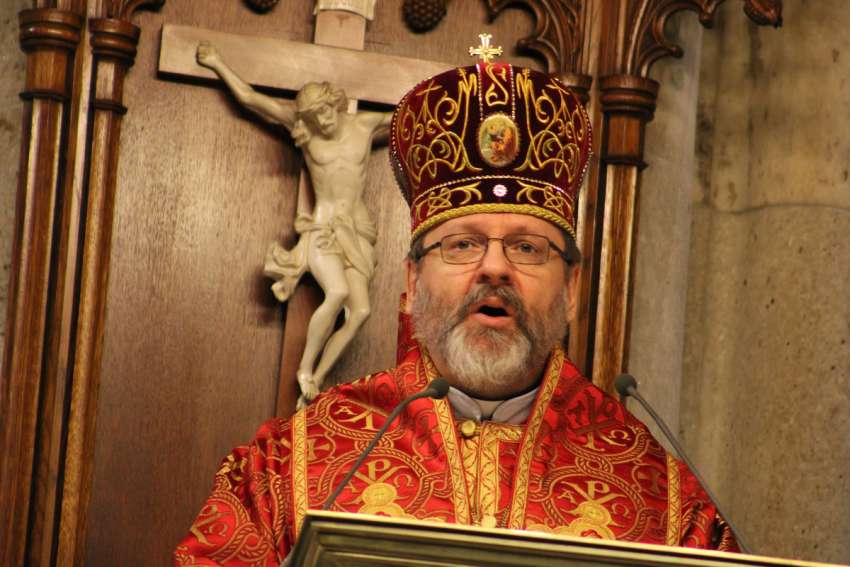"The Russians are doing everything to break Ukrainians, arousing emotions and suspicions about the loyalty of allies, confusing them so they trust no one, not even their own capacities," said Major Archbishop Sviatoslav Shevchuk of Kyiv-Halych.
"The pope's statements are difficult especially in the Ukrainian context, where there's an Orthodox majority and Orthodox people are asking us why we are still Catholics," he said.
Speaking March 20 to Catholic journalists from neighboring Poland, the major archbishop said Ukrainian Catholics understood the Christian calling to forgiveness and reconciliation, but could not have these imposed during a war for national survival.He added that he feared the idea of reconciliation could be discredited by ostentatious initiatives, and that Pope Francis was being "instrumentalized" in a "major informational and psychological special operation."
"Forgiveness in war is only possible when it means sharing the forgiveness each of us has already received from God -- forgiveness doesn't mean allying with evil or condoning someone's crimes," said Major Archbishop Shevchuk, whose comments were carried by Poland's Catholic Information Agency, KAI.
"As for reconciliation with the Russian aggressor, this whole process lies ahead of us. ... It's hard to reconcile when someone is bombing and shooting at us and not allowing us the right to exist," he added.
The Catholic leader made the comments as Kyiv came under fresh Russian missile strikes and as reactions continued to the pope's call in interview extracts, published March 9 by Switzerland's RTS media network, for Ukrainians to "have the courage of the white flag" and not be "ashamed" to negotiate before things get worse.
Major Archbishop Shevchuk said he had been interviewed by the same RTS journalist, who routinely employed underhanded methods, adding that the Vatican was not using "all its possibilities" to protect Pope Francis "against manipulation" in a continuing "information crisis."
Ukrainians had already experienced a "crisis of faith in the pope's primacy," Major Archbishop Shevchuk said, and that the pope's latest statements were "deeply hurtful," with Ukrainians perceiving them "not only on a political and diplomatic level, but also on a spiritual level."
"The Orthodox ask us, 'Why are you still Catholic?' Every moment when I have to comment on such situations is for me a confession of the Catholic faith, an opportunity to testify, to justify my hope," he said.
"But we remain Catholics, not because Francis is pope but because this is how Christ founded his church," the prelate continued. "The rock of Peter stands firm, and the gates of hell will not prevail against the church built on Peter's rock. This is the meaning of the Catholic faith we must now proclaim in Ukraine."
Ukrainians have protested previous remarks about the war by the Argentina-born pope, most recently in August when he called on Russian Catholics to uphold the legacy of their country's "great, enlightened Russian Empire."
Major Archbishop Shevchuk said the war, now in its third year, had inflicted "great tragedy" not only on Ukraine but on Europe as a whole, adding that his country, although wounded, would "never be conquered and never surrender."
He said hundreds of thousands of families had lost loved ones on the 1,200-mile front line, where defensive preparations are underway for a Russian spring offensive, or in drone attacks on civilian targets, while Ukraine also was home to 200,000 war disabled, including 50,000 amputees, with 35,000 people registered as missing.
He added that he had submitted a list of 3,000 prisoners to the pope, requesting help obtaining their release, but said POWs were being used by Russia as "an instrument of psychological torture," inflicting "daily mental and spiritual torture" on their families.
"Those mutilated are often demobilized without care from the state -- they sometimes need expensive therapy and medicines, and their only hope is their parish and family," said the Ukrainian Catholic leader, who studied medicine before being ordained in 1994.
"They feel burdensome and have suicidal thoughts, while they also feel guilty their comrades are dead and they're alive," he said. "This adds pressure on their families, for whom it's a daily drama, and I'm deeply grateful to wives who haven't abandoned their husbands and are caring for them in a heroic testimony of marital love. Sometimes the mental trauma is more severe than physical wounds."
On March 21, residents of Kyiv were woken up by loud explosions around 5 a.m. as 31 ballistic and cruise missiles fired by Russia arrived at roughly the same time from different directions, The Associated Press reported.
Air defenses shot down all the incoming missiles, though 13 people including a child were injured by falling wreckage.
An 11-year-old girl and a 38-year-old man were hospitalized in Kyiv, the city administration said. Eight other people sustained light injuries, according to Mayor Vitali Klitschko.Ukraine's Emergency Service said around 80 people were evacuated from their homes, AP said.


